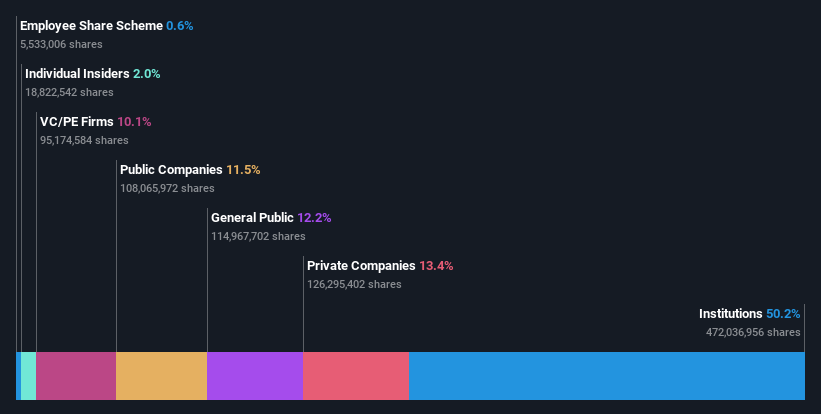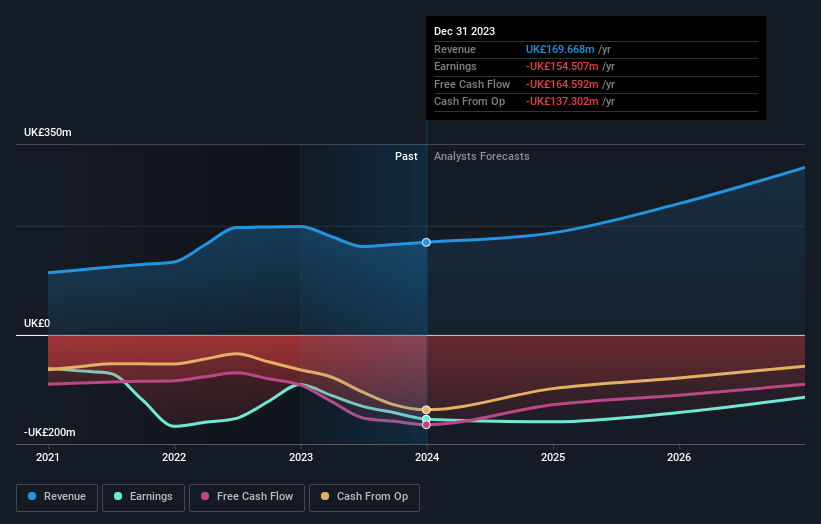
Key Insights
-
Given the large stake in the stock by institutions, Oxford Nanopore Technologies’ stock price might be vulnerable to their trading decisions
-
The top 11 shareholders own 50% of the company
To get a sense of who is truly in control of Oxford Nanopore Technologies plc (LON:ONT), it is important to understand the ownership structure of the business. The group holding the most number of shares in the company, around 50% to be precise, is institutions. Put another way, the group faces the maximum upside potential (or downside risk).
Given the vast amount of money and research capacities at their disposal, institutional ownership tends to carry a lot of weight, especially with individual investors. As a result, a sizeable amount of institutional money invested in a firm is generally viewed as a positive attribute.
Let’s take a closer look to see what the different types of shareholders can tell us about Oxford Nanopore Technologies.
View our latest analysis for Oxford Nanopore Technologies
What Does The Institutional Ownership Tell Us About Oxford Nanopore Technologies?
Many institutions measure their performance against an index that approximates the local market. So they usually pay more attention to companies that are included in major indices.
We can see that Oxford Nanopore Technologies does have institutional investors; and they hold a good portion of the company’s stock. This suggests some credibility amongst professional investors. But we can’t rely on that fact alone since institutions make bad investments sometimes, just like everyone does. It is not uncommon to see a big share price drop if two large institutional investors try to sell out of a stock at the same time. So it is worth checking the past earnings trajectory of Oxford Nanopore Technologies, (below). Of course, keep in mind that there are other factors to consider, too.
Since institutional investors own more than half the issued stock, the board will likely have to pay attention to their preferences. We note that hedge funds don’t have a meaningful investment in Oxford Nanopore Technologies. IP Group Plc is currently the company’s largest shareholder with 10% of shares outstanding. Baillie Gifford & Co. is the second largest shareholder owning 6.9% of common stock, and Tencent Holdings Limited holds about 6.7% of the company stock. In addition, we found that Gurdial Sanghera, the CEO has 1.4% of the shares allocated to their name.
After doing some more digging, we found that the top 11 have the combined ownership of 50% in the company, suggesting that no single shareholder has significant control over the company.
While studying institutional ownership for a company can add value to your research, it is also a good practice to research analyst recommendations to get a deeper understand of a stock’s expected performance. Quite a few analysts cover the stock, so you could look into forecast growth quite easily.
Insider Ownership Of Oxford Nanopore Technologies
The definition of an insider can differ slightly between different countries, but members of the board of directors always count. Management ultimately answers to the board. However, it is not uncommon for managers to be executive board members, especially if they are a founder or the CEO.
I generally consider insider ownership to be a good thing. However, on some occasions it makes it more difficult for other shareholders to hold the board accountable for decisions.
We can report that insiders do own shares in Oxford Nanopore Technologies plc. This is a big company, so it is good to see this level of alignment. Insiders own UK£23m worth of shares (at current prices). It is good to see this level of investment by insiders. You can check here to see if those insiders have been buying recently.
General Public Ownership
The general public– including retail investors — own 12% stake in the company, and hence can’t easily be ignored. While this group can’t necessarily call the shots, it can certainly have a real influence on how the company is run.
Private Equity Ownership
Private equity firms hold a 10% stake in Oxford Nanopore Technologies. This suggests they can be influential in key policy decisions. Some might like this, because private equity are sometimes activists who hold management accountable. But other times, private equity is selling out, having taking the company public.
Private Company Ownership
We can see that Private Companies own 13%, of the shares on issue. It’s hard to draw any conclusions from this fact alone, so its worth looking into who owns those private companies. Sometimes insiders or other related parties have an interest in shares in a public company through a separate private company.
Public Company Ownership
We can see that public companies hold 11% of the Oxford Nanopore Technologies shares on issue. This may be a strategic interest and the two companies may have related business interests. It could be that they have de-merged. This holding is probably worth investigating further.
Next Steps:
It’s always worth thinking about the different groups who own shares in a company. But to understand Oxford Nanopore Technologies better, we need to consider many other factors. Consider for instance, the ever-present spectre of investment risk. We’ve identified 3 warning signs with Oxford Nanopore Technologies , and understanding them should be part of your investment process.
Ultimately the future is most important. You can access this free report on analyst forecasts for the company.
NB: Figures in this article are calculated using data from the last twelve months, which refer to the 12-month period ending on the last date of the month the financial statement is dated. This may not be consistent with full year annual report figures.
Have feedback on this article? Concerned about the content? Get in touch with us directly. Alternatively, email editorial-team (at) simplywallst.com.
This article by Simply Wall St is general in nature. We provide commentary based on historical data and analyst forecasts only using an unbiased methodology and our articles are not intended to be financial advice. It does not constitute a recommendation to buy or sell any stock, and does not take account of your objectives, or your financial situation. We aim to bring you long-term focused analysis driven by fundamental data. Note that our analysis may not factor in the latest price-sensitive company announcements or qualitative material. Simply Wall St has no position in any stocks mentioned.
Have feedback on this article? Concerned about the content? Get in touch with us directly. Alternatively, email editorial-team@simplywallst.com

